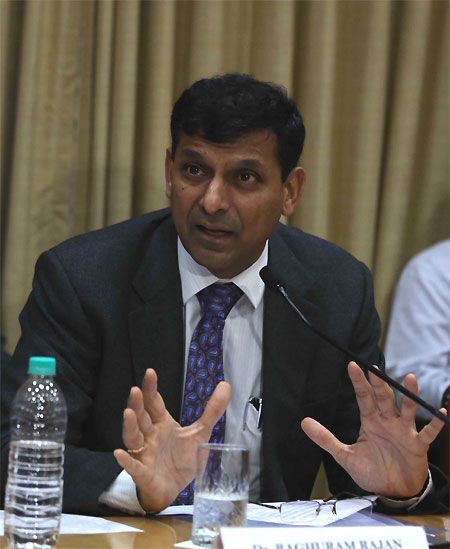 Reserve Bank Governor Raghuram Rajan on Friday said the central bank is looking at allowing full capital account convertibility in a few years.
Reserve Bank Governor Raghuram Rajan on Friday said the central bank is looking at allowing full capital account convertibility in a few years.
"My hope is that we will get to full capital account convertibility in a short number of years," he said.
Full capital convertibility means a foreign investor can repatriate his money into his own local currency at will, which is not allowed in the country now.
Stating that the RBI is fairly open to capital inflows, the Governor said: "The only place today that we have some restrictions is inflows into debt, especially very short-term debt.
"I think most people would agree that opening up to short-term debt flows is usually not very clever for reasons of financial stability," Rajan said while delivering Kale Memorial Lecture at the Gokhale Institute of Politics and Economics.
Rajan's comment on full capital convertibility assumes importance as Finance Minister Arun Jaitley today launched the country's first international finance centre in Gujarat. Full rupee convertibility can go a long way in the effective functioning this global financial services hub.
It may be noted that many analysts had credited the RBI for its policy of partial capital control, which helped it tide over the impacts of the currency meltdown that many South Asian economies which had full capital convertibility in 1997-98.
In May-August 2013, capital control helped the country from going to the dumps following the taper talks by the US Fed. Even then the country saw as many as over $20 billion being pulled out of the country by foreign investors.
Following the June 1991 liberalisation, the government and the RBI have been progressively lifting curbs on capital flows, which saw the FII investment into domestic debt rise to $31 billion now.
Amidst fears that inflation may get out of control again following damages to standing crops due to the unseasonal rain in many parts of the country, Rajan said, "The central bank can't control food inflation."
It may be noted that Rajan desisted from cutting rates at the last monetary policy meet on April 7 citing a possible spike in retail inflation due to higher food prices due to unseasonal rains and fears of El Nino effect on the southwest monsoon this year. Food prices have nearly 50 per cent weight in the retail inflation basket.
"People have to eat and people will choose what they eat. There are certain types of consumption that are more easily controlled... but food is not one of the things that is easily controlled," he said.
On the role of food prices play in overall inflation, he said, "This means that if there are changes in food supply, which cause inflation, we have to watch those...One of the tenets of monetary policy is to accommodate supply shocks, but make sure you ward off second round effects, which means food inflation should not translate into higher wage inflation, which translates into more food inflation, and then gets into an inflationary spiral."
"So we can accommodate food inflation, but we are looking to ward off the second round effects," while answering queries from the students.
On the new inflation management policy under which the government will set an inflation target for RBI to achieve, Rajan said, "We have given ourselves a two-year horizon, in which if we breach the inflation target, we want to bring inflation back into control.
"This is a medium-term flexible inflation targeting. What this means is that if we breach the limit today as the monsoon isn't very effective, but the monsoon not being effective doesn't necessarily mean higher food inflation...but suppose that happens, we can't let inflation go up, but ensure that it doesn't then percolate elsewhere," he said.
Picking holes again in the accommodative monetary policies of Western central banks, he said one of the paradoxes in the West's attempt to get out of the present de-growth is that they are trying the very same policies that they had tried before the great financial crisis, which have so far proved ineffective as those policies only increased their leverage levels and not growth.
"The Western central banks started the extremely accommodative monetary policy hoping that this will somehow generate self-sustaining growth.. but instead of generating growth it generated more and more leverage. The industrial country are highly over leveraged," Rajan said.
It can be recalled that Rajan has been calling for more coordination between central banks of emerging and emerged markets saying the latter's lose monetary policies have larger debilitating impact on the former.
"How is it that policies 10,000 miles away can affect us. It can affect us in a way that our policies are left ineffective and become detrimental to our goals," he said.
Explaining further he said this over-leveraging is not only choking growth in the developed economies, but also in those emerging market where there has been high leveraging.
"This leveraging is now moving to emerging markets and a few countries, thankfully not ours as yet, has also choked up growth," Rajan said adding, "There has to be concerns that the rules of the game are not fairly the same across the world."
On growth, he expressed hope that in a very short while, we will become a middle-income country.
"In many ways, I hope, of another long period of sustained high growth for us. This time around we are starting from not low income but almost middle income. I hope in a very short while we will become middle income country," Rajan said.
Calling for sustainable high growth, wherein there is moderate inflation, he said, "We would love to have 9-10 per cent growth, but when it comes to double digit or triple digit
inflation, it becomes an unstable situation. So we need to keep growth consistent with moderate level of inflation, which is what we have been doing."





